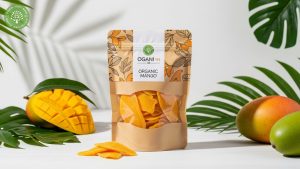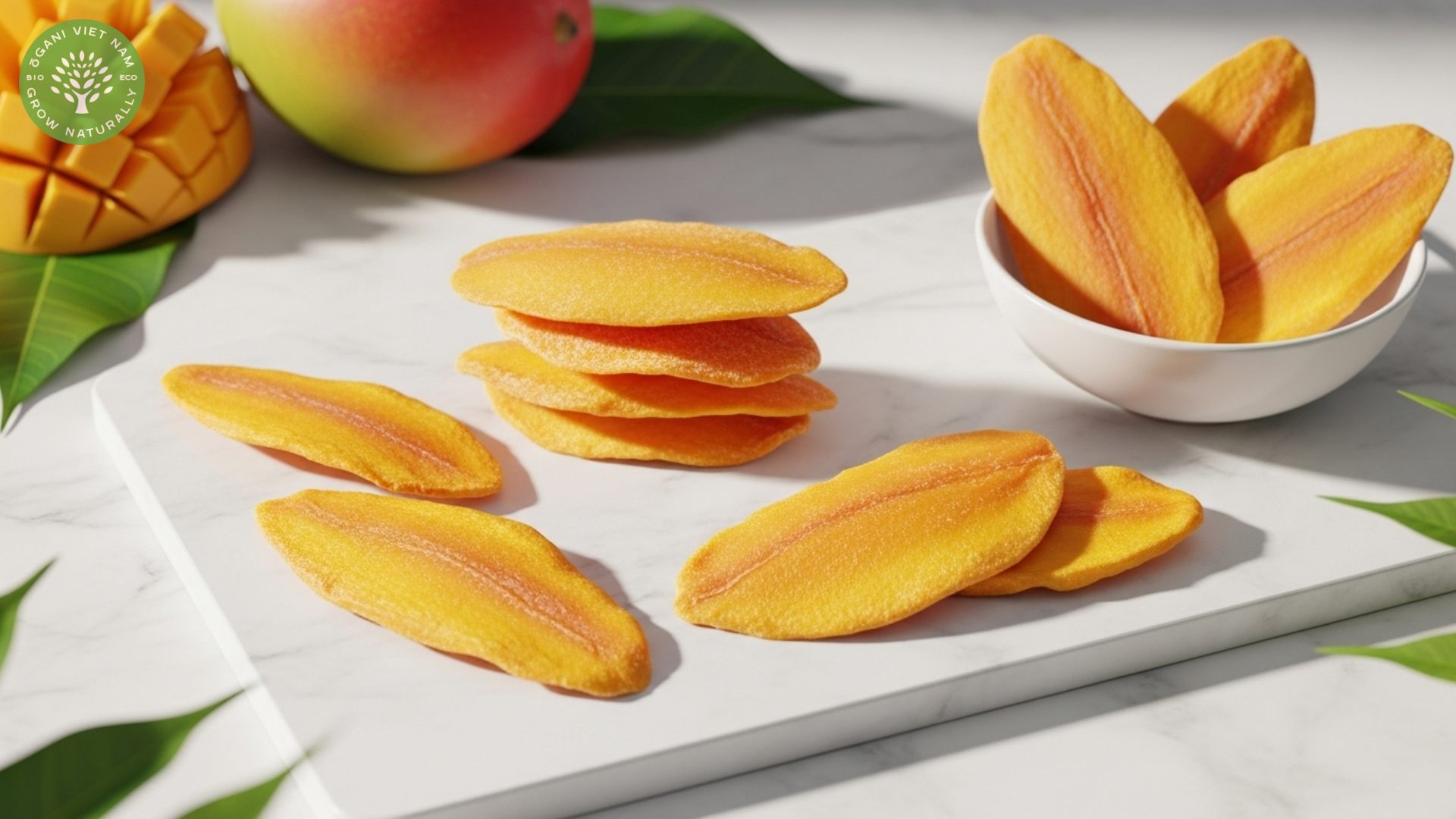What are the benefits of eating dried mango? This golden tropical treat delivers impressive health advantages including immune system support through high vitamin C content, improved digestion from natural fiber, and sustained energy from concentrated natural sugars. At Ogani VN, we’ve seen countless customers transform their snacking habits by choosing this nutrient-dense option over processed alternatives.
What are the benefits of eating dried mango for your nutrition

When fresh mangoes undergo the drying process, their nutrients become concentrated, creating a snack that’s remarkably dense in vitamins and minerals. Each serving of dried mango delivers approximately 160 calories along with essential nutrients your body craves throughout the day.
The vitamin C content in dried mango stands out particularly – just a handful provides a significant portion of your daily requirement. This powerful antioxidant doesn’t just fight free radicals; it actively participates in collagen production, helping maintain healthy skin elasticity and wound healing. We’ve noticed that customers who regularly include dried mango in their diet often report improvements in their overall vitality.
Beyond vitamin C, you’re getting vitamin A which supports eye health and immune function, plus B vitamins that help convert food into usable energy. The mineral profile includes potassium for heart health, magnesium for muscle function, and iron for oxygen transport throughout your body. Unlike many processed snacks that offer empty calories, dried mango provides genuine nutritional value with every chewy piece.
The fiber content deserves special attention – about 2 grams per serving. While that might not sound revolutionary, it’s substantial for a sweet snack. This soluble and insoluble fiber combination supports digestive regularity and helps you feel satisfied longer, reducing the temptation to reach for less healthy options an hour later.
What are the benefits of eating dried mango for digestive health

Your digestive system treats dried mango like a welcome guest rather than an intruder. The natural enzymes present in mangoes, particularly amylase, help break down complex carbohydrates into simpler sugars that your body can easily absorb and utilize for energy.
The prebiotic properties of dried mango feed the beneficial bacteria living in your gut. These friendly microorganisms, often called probiotics, thrive when given the right fuel. A healthy gut microbiome doesn’t just improve digestion – it influences everything from your immune response to your mood regulation. Some research suggests that the polyphenols in mangoes can positively shift the balance of gut bacteria toward more beneficial species.
People dealing with occasional constipation find relief through the fiber in dried mango. Unlike harsh laxatives, this works gently by adding bulk to stool and promoting regular bowel movements. The natural sugars also draw water into the intestines, further supporting healthy elimination. We recommend starting with a small portion if you’re new to dried fruit, then gradually increasing as your digestive system adapts.
The anti-inflammatory compounds in dried mango may also soothe the digestive tract lining. While it’s not a cure for serious digestive disorders, many of our customers report feeling less bloated and more comfortable after making it a regular part of their eating pattern.
What are the benefits of eating dried mango for immunity and energy
Immune system strengthening

Your immune system operates like a complex security network, constantly identifying and neutralizing threats. The antioxidants in dried mango act as reinforcements for this defense system. Vitamin C stimulates the production and function of white blood cells, your body’s primary infection fighters.
But the immune benefits extend beyond just vitamin C. Beta-carotene, which gives mangoes their golden-orange color, converts to vitamin A in your body. This vitamin maintains the integrity of mucous membranes in your respiratory tract and digestive system – your first line of defense against pathogens trying to enter your body.
The polyphenols in dried mango, including mangiferin, demonstrate antimicrobial and antiviral properties in laboratory studies. While eating dried mango won’t replace proper medical treatment, it contributes to a dietary pattern that supports your body’s natural defense mechanisms. Think of it as giving your immune system better tools to work with.
During seasons when everyone around you seems to be catching something, maintaining consistent vitamin C intake becomes even more critical. Unlike vitamin C supplements that can upset sensitive stomachs, the benefits of eating dried mango include delivering this nutrient in a food matrix that’s gentle on your digestive system and accompanied by other supportive compounds.
Energy boost without the crash
We’ve all experienced that afternoon slump when energy plummets and concentration becomes nearly impossible. Dried mango offers a solution that works differently than caffeine or processed sugar snacks. The natural sugars – primarily fructose and glucose – provide quick energy, while the fiber content slows absorption just enough to prevent the dramatic spike-and-crash cycle.
Athletes and active individuals particularly appreciate dried mango as a pre-workout snack. The easily digestible carbohydrates fuel muscles without causing gastrointestinal distress during exercise. Post-workout, those same carbohydrates help replenish glycogen stores, supporting faster recovery.
The B vitamins present in dried mango play crucial metabolic roles, helping your cells extract energy from the food you eat. Vitamin B6, for instance, participates in over 100 enzyme reactions, many related to energy metabolism. When combined with the natural sugars and minerals like magnesium, you’re getting a coordinated nutritional package that supports sustained energy production.
For students or professionals facing long work sessions, keeping dried mango at your desk provides a better alternative to candy or energy drinks. You get the mental boost from glucose reaching your brain, plus the satisfaction of actually nourishing your body rather than just stimulating it temporarily.
Skin health and anti-aging effects
The connection between what you eat and how your skin looks isn’t just vanity – it’s biochemistry. Dried mango supplies your body with building blocks for healthy skin from the inside out. The vitamin C content directly supports collagen synthesis, the protein that gives skin its structure and elasticity.
As we age, collagen production naturally declines, leading to wrinkles and sagging. While no food can stop aging, providing your body with adequate vitamin C helps optimize whatever collagen production is still happening. The vitamin A in dried mango supports skin cell turnover, helping you shed dead cells and reveal fresher skin beneath.
The antioxidants combat oxidative stress caused by sun exposure, pollution, and normal metabolism. Free radicals damage cellular structures including DNA, proteins, and lipids in skin cells. By neutralizing these reactive molecules, the antioxidants in dried mango help protect skin from premature aging. Some people notice that after consistently eating dried mango for several weeks, their skin appears more radiant and feels more supple.
The copper content, though present in small amounts, aids in melanin production – the pigment that gives skin its color and provides natural sun protection. While you still absolutely need sunscreen, every bit of internal support helps your skin defend itself against environmental damage.
What are the benefits of eating dried mango in daily life

Practicality matters when making healthy food choices sustainable. Dried mango doesn’t require refrigeration, won’t bruise in your bag, and stays fresh for months when properly stored. This convenience factor transforms it from an occasional treat into a reliable dietary staple.
At Ogani VN, we’ve watched customers get creative with how they incorporate dried mango into their daily routine. Some chop it and add to morning oatmeal for natural sweetness and chewy texture. Others blend it into smoothies or energy balls. Trail mix enthusiasts combine it with nuts and seeds for a balanced snack that offers protein, healthy fats, and quick carbohydrates.
The portion control is straightforward – unlike with fresh mangoes where you might not realize how much you’ve eaten until the whole fruit is gone, dried mango pieces make it easy to grab a measured amount. We typically recommend about 40 grams (roughly a small handful) as a satisfying serving that delivers benefits without excessive sugar intake.
Children who resist eating fresh fruit often accept dried mango enthusiastically, making it a useful tool for parents trying to increase their kids’ nutrient intake. The naturally sweet taste requires no convincing, and kids rarely realize they’re eating something genuinely good for them. Just remember to encourage proper dental hygiene since the natural sugars can cling to teeth.
Frequently Asked Questions
How much dried mango should I eat daily?
A reasonable portion is about 30-40 grams per day, which equals roughly 8-10 pieces depending on thickness. This provides nutritional benefits while keeping sugar intake moderate. Listen to your body and adjust based on your overall diet and activity level.
Is dried mango better than fresh mango?
Each has advantages. Fresh mango contains more water and vitamin C, while dried mango offers concentrated nutrients and superior portability. Neither is universally “better” – they serve different purposes. We rotate between both depending on convenience needs and what sounds appealing that day.
Can diabetics eat dried mango?
People with diabetes should exercise caution and consult their healthcare provider. Dried mango does contain concentrated natural sugars that can affect blood glucose levels. If approved by your doctor, consume small portions alongside protein or healthy fats to moderate blood sugar impact.
Does dried mango cause weight gain?
Like any food, dried mango can contribute to weight gain if consumed in excessive amounts beyond your caloric needs. However, when enjoyed as part of a balanced diet in appropriate portions, it supports healthy eating patterns rather than sabotaging them. The fiber and nutrients make it more satisfying than many alternatives with similar calorie counts.
Should I choose organic dried mango?
Organic dried mango avoids pesticide residues and often contains no added sulfites or preservatives. At Ogani VN, we prioritize organic options because they align with our commitment to pure, clean nutrition. The taste difference is subtle, but knowing you’re avoiding unnecessary chemicals provides peace of mind.
Make dried mango part of your wellness routine

The benefits of eating dried mango extend far beyond just satisfying your sweet tooth. From strengthening your immune defenses and supporting digestive health to providing clean energy and promoting glowing skin, this tropical superfood earns its place in your daily routine. The concentrated nutrients, convenient portability, and delicious taste make it an easy choice for anyone seeking to improve their snacking habits.
At Ogani VN, we’re passionate about connecting you with premium dried mango that maintains maximum nutritional value through careful processing. Ready to experience these benefits yourself? Browse our selection of organic dried mango products today and discover why thousands of health-conscious customers trust us for their premium dried fruit needs. Your body will thank you for making this simple, delicious upgrade to your nutrition.
Read more:
- Dried Mango Is It Good For You: Complete Health Guide 2025
- Best Dried Mango No Sugar Added: Premium Quality Guide
- Calories In Dried Mango No Sugar Added: Complete Nutrition Guide
- Are Dried Mangoes Good For You? The Complete Health Guide
- What Are the Benefits of Eating Dried Mango


